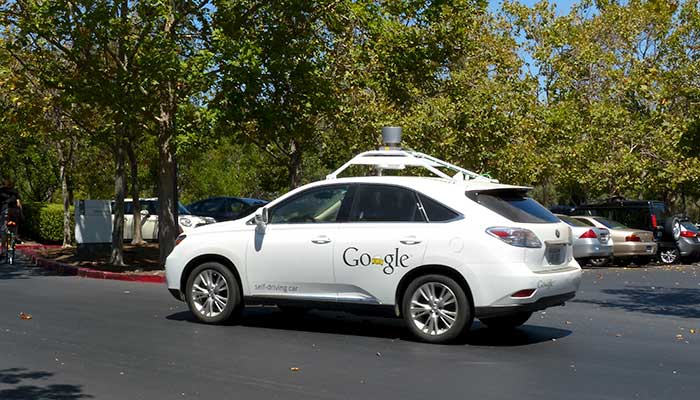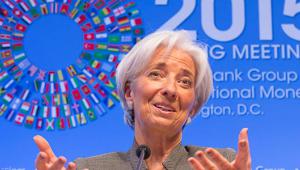web_googledriverlesscar_9602706758_690f7b1150_o.jpg

A Google self-driving car. Lagarde said the world economy may be on the cusp of a digital revolution, where such technologies become ubiquitous. Credit: Roman Boed
While the global economy appears to be wedged in a rut, with a weak outlook for both growth and trade, Lagarde said it may also be on the cusp of a digital revolution, where intelligent machines are central to life.
“We could approach an inflection point where autonomous cars and trucks become ubiquitous,” she said. “Where robots and automation become indispensible in all industries. Where cell phones replace bank branches, Where artificial intelligence and quantum computing turbocharge research and revolutionise the global economy.”
Much like the industrial revolution, she continued, this is likely to lead to bring more progress for the high-skilled, and further pressure on those less able to compete.
“There is no doubt that technology has added to global welfare... Yet we also know that during major economic transitions, some get left behind, and many suffer.”
While she said the world needs this transition and needs to accelerate towards it, she also said it was crucial to “manage it wisely”, or else “globalisation may face major reversals”.
She reiterated her call for a “three-pronged” policy approach, incorporating fiscal, monetary and structural measures, and optimising the synergies between them, to jumpstart the global economy.
Likewise, she stressed, again, that “there is no better time for public investment”, to take advantage of historically low interest rates and improve access to high-speed internet, promote energy-efficient transport and build climate friendly infrastructure.
“Even where fiscal space is unavailable, governments can reallocate funds into R&D [research and development] – by offering tax credits and supporting public research institutions,” she added.
As well as reinvigorated growth, she said that reinvigorated trade would be needed. While Lagarde acknowledges that globalisation has left many behind, in her view protectionism is counterproductive and a “sure way to reduce overall output, investment and jobs”.
But more does need to be done to mitigate the negative effects of trade, she continued. “Achieving inclusion is actually a tall order. It requires more than macroeconomics. It also involves politics. And social contracts – which must reflect national, regional and cultural diversity.”
She called for measures toward equality of opportunity, such as smart education policies, especially for girls. Fair burden sharing must also be promoted, she said, through an international tax system with minimal loopholes, protections against corruption, and safeguards for low-income nations. Finally, she said competition and market access needed to be preserved.
“Our task is to manage wisely the economic transition facing us, so that we can achieve greater prosperity – not just for the fortunate few, but for all,” she concluded.
IMF members have committed $340bn in bilateral borrowing throughout the annual meetings, which will keep the fund’s firepower at close to $1tn. Members have also agreed to continue the fund’s zero interest rate policy for low-income nations for another two years.
Lagarde, as well as the heads of other global financial institutions and development banks, also published a joint letter yesterday outlining how they will achieve the Sustainable Development Gaols by 2030 – expected to cost more than $1tn every year.
Signatories included head of the World Bank, Jim Yong Kim, the African and Asian development banks, Akinwumi Adesina and Takehiko Nakao, European institutions such as the European Bank for Reconstruction and Development, Suma Chakrabarti, and recently established development banks, such as the New Development Bank Kundapur Vaman Kamath.
They agreed to: enhance coordination and collaboration; support the historic deal on climate change signed by almost 200 nations in Paris last year; bridge the gap between humanitarian and development assistance; and, scale up financing by optimising balance sheets and finding innovative ways to leverage new resources.












